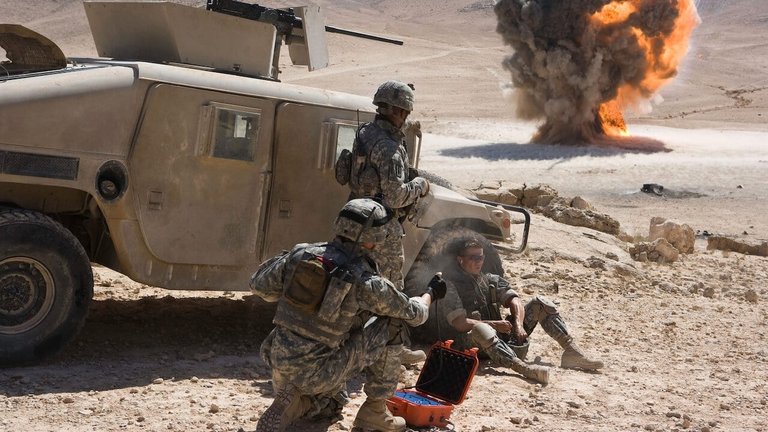Film Review: The Hurt Locker (2008)

The Oscars, once revered as the pinnacle of cinematic achievement, have gradually diminished in prestige and significance over the years. This decline is evident not only among casual moviegoers but also among dedicated cinephiles, many of whom struggle to recall the titles of Oscar-winning films from recent decades. The phenomenon may serve Hollywood well, particularly when past winners in time become sources of embarrassment or discomfort. A notable example is The Hurt Locker, Kathryn Bigelow's 2008 war drama that explores a chapter of American history that many limousine liberals, including those within Hollywood, now prefer to ignore.
The plot is set in Iraq a year after the United States invaded and occupied the country. Many Iraqis are unhappy about foreign troops on their soil, and some have joined the ranks of insurgents. Their favorite tactic is setting up and detonating improvised explosive devices (IEDs). The US Army has given the task of removing them to Explosive Ordinance Disposal (EOD) teams, like the one led by Staff Sergeant Matthew Thompson (played by Guy Pearce). After he dies trying to disarm one such bomb, the surviving members of his team, Sergeant J. T. Sanborn (played by Anthony Mackie) and Specialist Owen Eldridge (played by Brian Geraghty), are given a new leader, Staff Sergeant Howard James (played by Jeremy Renner). Compared to his predecessor, James seems strangely laid back about his work. He is prone to straying from the protocol, and as time goes by, his teammates begin to question his methods and even his sanity. James, however, appears very good at what he does, although in a country as dangerous as Iraq, it only takes one wrong decision to cost him and his men their lives.
The Hurt Locker emerged at the tail end of George W. Bush's presidency, a period marked by widespread disillusionment with the Iraq War among the American populace. Hollywood, which already shared the same views, was trying to exploit this sentiment with a series of dramas related to the subject. It could be argued that Academy voters interpreted Bigelow's film as belonging to the same trend and awarded it as the most critically praised and, to a degree, most audience-friendly among the group.
The film was written and co-produced by Mark Boal, a journalist who had been embedded with EOD teams in Iraq and would later also write and produce another Bigelow’s film with similar theme, Zero Dark Thirty. Boal's insight guaranteed the film's authenticity, although it was later heavily criticized by Iraq War veterans for a series of inaccuracies regarding tactics, protocol, and general attitudes.
While The Hurt Locker could be interpreted as an anti-war drama, Bigelow may not have been the ideal choice for this narrative direction. Renowned for her expertise in action filmmaking, she emphasises tension and suspense over overt political commentary. However, viewers seeking an anti-war message might find it subtly woven into James's character—who proudly agrees with himself being described as "redneck" and "cowboy," very much in line with the stereotypes of Bush and his voters.
On the other hand, James, played very well by Jeremy Renner in one of his early starring roles (and who would later be reunited with Anthony Mackie in MCU films), is portrayed as a consummate professional. He is very proud of his job, which involves saving instead of taking lives. He cares deeply about his men, feels embarrassed by his mistakes, and devastated when he fails in his task. Furthermore, the opening titles of the film suggest that for some individuals, the excitement and adrenaline rush that comes with war is irresistible. They, like the protagonist near the end of the film, appear lost and unfulfilled with safe but boring civilian life.
On a technical level, The Hurt Locker stands out as one of the best-directed films of the 21st century. With cinematographer Barry Ackroyd’s expertise, Bigelow crafts visually stunning sequences that capture both action and emotion—most notably during Thompson’s harrowing death at the film’s outset. Despite its loose narrative structure and lack of a traditional antagonist, The Hurt Locker maintains audience engagement throughout its runtime. Its success is particularly impressive given its modest budget and the logistical challenges faced during filming in Jordan, which borders war-torn Iraq.
Unlike Academy voters, the audience, especially in the USA, didn't have much understanding for the film despite the Oscar buzz. Probably, they preferred to erase the traumatic and increasingly embarrassing Iraq misadventure from collective memory. And this is quite a shame, because, regardless of what some might think about the rights or wrongs of the Iraq War, The Hurt Locker represents a fine piece of cinema.
RATING: 8/10 (+++)
Blog in Croatian https://draxblog.com
Blog in English https://draxreview.wordpress.com/
InLeo blog https://inleo.io/@drax.leo
Hiveonboard: https://hiveonboard.com?ref=drax
Rising Star game: https://www.risingstargame.com?referrer=drax
1Inch: https://1inch.exchange/#/r/0x83823d8CCB74F828148258BB4457642124b1328e
BTC donations: 1EWxiMiP6iiG9rger3NuUSd6HByaxQWafG
ETH donations: 0xB305F144323b99e6f8b1d66f5D7DE78B498C32A7
BCH donations: qpvxw0jax79lhmvlgcldkzpqanf03r9cjv8y6gtmk9